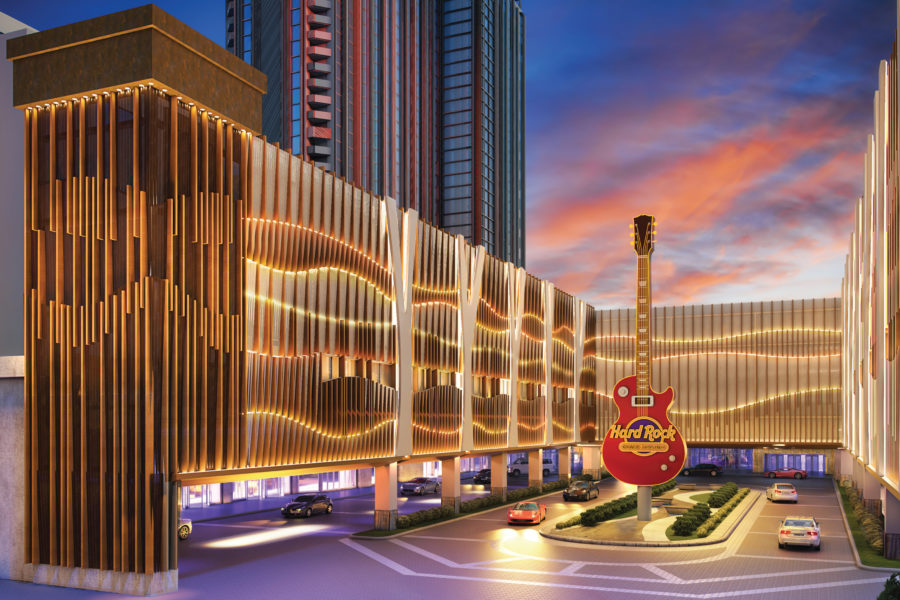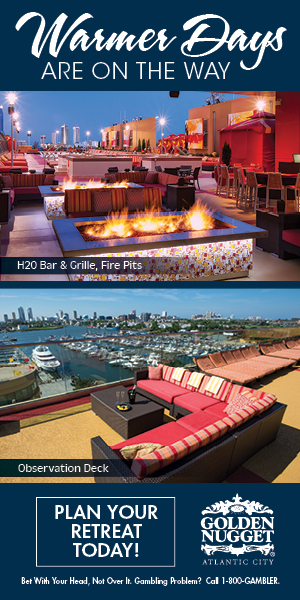
Joe Jingoli and Jack Morris were checking in on a very good day to be involved in an Atlantic City casino property. Earlier that morning, in a decision many people had dreamed of and worked toward for years, the U.S. Supreme Court had legalized sports gambling on a state-by-state basis.
Suddenly, what some had viewed as a somewhat misguided pursuit—opening a casino in a town that couldn’t seem to stop closing them—had received the gift of a potentially gushing revenue stream. Images of packed sports books no doubt rushed through every casino executive’s head, but for Jingoli and Morris, who were betting that the Hard Rock brand would propel their project into the profit column, this was an extremely positive way to enter Atlantic City’s treacherous climate.
“This is very exciting for Atlantic City,” Jingoli says.
Neither he nor Morris was willing to provide any specifics on just what sports betting would mean for the Hard Rock Hotel & Casino because they aren’t casino operators, but each knew that the ruling would have a substantially lucrative impact on the town.
“Sports betting is such a positive thing,” Morris said.
The trick now is to make the rest of the place a great experience for Atlantic City visitors. Opening in late June in the tattered remains of the failed Trump Taj Mahal, the Hard Rock has exquisite timing. Boasting 2,000 rooms, the 7,000-seat Etess Arena, 2,100 slot machines and plenty more—including, of all things, a gas station—it brings an entertainment component to the Boardwalk that goes well beyond whether or not the dealer is going to bust hitting on 13.
Jingoli and Morris, a couple of Jersey guys who are successful developers, are taking their first steps into the gaming world. Partnering with Hard Rock International was a pretty smart way to do it, since the company has established successful footholds across the country and the world. Of course, Hard Rock also recently got out of the fun-and-games business in Vegas by selling its property to Virgin Hotels founder Richard Branson and some private partners, but the company’s rock-and-roll persona is well known. Hard Rock chairman Jim Allen is enthusiastic about the new property, and the company has devoted considerable resources to its success.
“I was introduced to Jim Allen and had the opportunity to really see how passionate he is about the brand and what the brand is all about,” Morris says. “When people hear Hard Rock, they think rock-n-roll.”
Hard Rock has partnered with the Seminole Indian tribe to handle its casino ventures, and Allen pledges to be heavily involved in the AC property. It’s a great story. He grew up in nearby Northfield and was a dishwasher and a sous chef in an Atlantic City restaurant at one point in his life. Not long after that, he became a cook at Bally’s. Now, he’s one of the nation’s top gaming executives, and he is excited to be bringing one the nation’s—and the world’s—most iconic companies to AC.
“The Hard Rock brand has so much global recognition,” he says. “It was created in 1971, and the company continues to grow. We’re in 75 countries around the world, and we are undergoing major expansions in resorts and hotels. In any brand survey, Hard Rock is among the top 10 in recognizable brands in the world. Last year, we had 118 million visitors and 100 billion media impressions.”
The circumstances surrounding the Taj Mahal’s demise were hardly ideal. The casino opened in 1990 at a cost of $1.1 billion, and after truly Trumpian promotion and hype, it began to stagger. Trump filed for bankruptcy protection on it several times, and there were many years when his name was the only thing about it he owned. Earlier this decade, corporate raider Carl Icahn bought the property at a large discount and immediately went to war with the unions, refusing to honor their contracts. In 2016, Icahn won a court battle that allowed him to impose new wage, benefit and pension terms, but the workers promptly went on a strike that became the longest in AC casino history.
After losing millions a month, Icahn bailed, and Hard Rock—which had toyed with the idea of owning a property in town and actually had one of its restaurants in the Taj Mahal—swooped in and paid a meager $50 million for the joint. At a time when Atlantic City is facing unprecedented competition from regional gaming establishments, Hard Rock’s arrival is important, since it signals faith from a major player. The rest of the casino community, along with major government players, has embraced the arrival as a sign of growing critical mass in the city.
“We have received nothing but compliments, from the Division of Gaming Enforcement to the Casino Control Commission to the city of Atlantic City to former Governor [Chris] Christie and now Governor Murphy to the unions, with whom we already have eight agreements,” Allen says. “It has been all compliments.”
The decision to partner with Morris and Jingoli was a wise one, not only because it gave Hard Rock a local presence in town. The two men had enjoyed plenty of success in the development game and brought credibility and an understanding of the local landscape to the project, which is being overseen by Hard Rock’s people. Despite the hard times encountered by the Taj and the $2.4 billion Revel, which collapsed only two-and-a-half years after opening, the two men were optimistic from the outset that the project would be successful.
“We’re Jersey guys, and we really felt this was the bottom of the market,” Jingoli says. “Jack said, ‘This is the time to get in.’ It turned out to be accurate. You need to be on the ground here, and you need good market knowledge. Jack had all of that.”
Jingoli grew up in Trenton and went to the Pennington School. He and his brother started and operated a “small, family construction business in Mercer County” and built it into a concern that did business around the Mid-Atlantic region and in the Caribbean. Jingoli’s company is handling the building of the $206 million Stockton University campus in Atlantic City. His political connections and work in the energy field have been invaluable to the project.
Morris, meanwhile, has an impressive portfolio of residential and commercial properties across the state and has helped make Hard Rock’s foray into Atlantic City smoother.
“Jack’s success in New Jersey and experience as a real estate developer have been extremely helpful,” Allen says. “The Jingolis’ work with power plants and work in the area on Stockton University adds to it.”
The Hard Rock can offer the traditional casino and hotel amenities to guests, but its most unique features will be in the entertainment realm, from the “world’s largest collection of rock-n-roll memorabilia”, according to Allen, to venues like the Etess Arena, the Howie Mandel Comedy Club and a nightclub. In addition to Carrie Underwood and Pitbull, who opened the property, big names like Toby Keith, Blake Shelton and Steely Dan have been booked. Visitors can also enjoy Broadway productions of shows like “Kinky Boots”. Hard Rock properties hosted 35,000 shows last year, giving the corporation tremendous leverage with booking agents to attract acts to AC.
The project is not without its perils, as anyone who is familiar with Atlantic City over the past decade-plus knows. In 2006, casino revenues in the town peaked at more than $5 billion. That also happened to be the year Pennsylvania’s first casino opened for business. Since then, the take has slid precipitously, to $2.7 billion in 2017, according to the New Jersey Casino Control Commission. The Hard Rock will look great and have plenty to offer patrons, but with sports betting certain to expand opportunities in the region, the new project is hardly a sure bet. Atlantic City remains a city with a poverty rate above 30% and the highest foreclosure rate in America. There may be fun to be had on the Boardwalk, but it’s hard to sell visitors on the rest of the town.
Despite that, Morris believes the success of the Hard Rock, and ultimately Atlantic City, lies in the ability to create a destination, not just a home to the slot customer. He remembers sitting on the boardwalk with his grandfather, eating a bag of hot peanuts, going to the custard stand and smiling as “Mr. Peanut” strolled past. It’s a romantic reminiscence, to be sure, and one that he, Jingoli and Allen want to present in a 21st century form.
“That’s how I remember Atlantic City,” he says. “Millions of people remember Atlantic City for more than just slot machines and table games.”
The Hard Rock will sell entertainment, a gas station and convenience store, traditional gaming and sports gambling. It will also sell the ocean and a vision of Atlantic City that might not jibe with today’s reality, but which has been the dream of developers ever since Resorts International opened in 1978.
“We are bringing back entertainment, which has been an iconic part of Atlantic City,” Jingoli says. “We’re really excited.”
And expecting the Hard Rock to pay off big time.

